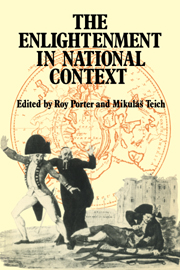Book contents
- Frontmatter
- Contents
- Preface
- 1 The Enlightenment in England
- 2 The Scottish Enlightenment
- 3 The Enlightenment in France
- 4 The Enlightenment in the Netherlands
- 5 The Enlightenment in Switzerland
- 6 The Italian Enlightenment
- 7 The Protestant Enlightenment in Germany
- 8 The Enlightenment in Catholic Germany
- 9 Reform Catholicism and Political Radicalism in the Austrian Enlightenment
- 10 Bohemia: From Darkness into Light
- 11 The Enlightenment in Sweden
- 12 The Russian Enlightenment
- 13 Enlightenment and the Politics of American Nature
- Afterword
- Notes to the text
- Further reading
- Index
6 - The Italian Enlightenment
Published online by Cambridge University Press: 24 September 2009
- Frontmatter
- Contents
- Preface
- 1 The Enlightenment in England
- 2 The Scottish Enlightenment
- 3 The Enlightenment in France
- 4 The Enlightenment in the Netherlands
- 5 The Enlightenment in Switzerland
- 6 The Italian Enlightenment
- 7 The Protestant Enlightenment in Germany
- 8 The Enlightenment in Catholic Germany
- 9 Reform Catholicism and Political Radicalism in the Austrian Enlightenment
- 10 Bohemia: From Darkness into Light
- 11 The Enlightenment in Sweden
- 12 The Russian Enlightenment
- 13 Enlightenment and the Politics of American Nature
- Afterword
- Notes to the text
- Further reading
- Index
Summary
The first Italian characteristic of the Italian Enlightenment is that Italy is a long mountainous country and by geography, history and politics was divided. Few thought about Italy. They thought of Lombardy, Venezia, the Papal States, Naples, Sicily, the duchies. Turin was psychologically not remote from Paris. Milan was near to Vienna. Naples was psychologically and politically much nearer to Madrid. Palermo felt to be near nowhere. As in every other country the Italian Enlightenment consisted of a series of small groups – learned marquises, liberal priests, angry anticlericals, cultured bibliophiles. These groups were of importance to a future Italy. But they were more isolated, they went a more solitary way, than similar groups in France or Germany.
The second Italian characteristic depended upon the existence of the Pope. In Rome sat the only international figure of Italy. The authority which he exercised in the church was exercised directly within the Papal States. But all the Italian churches, with the possible exception of Venice, were more dependent upon the administration of the Curia in Rome than the churches of Austria, Bavaria, France, Spain or Portugal. The Enlightenment always contained a criticism of obscurantism inside the church. In Italy such criticism was bound to take unique forms. On the one hand it sometimes made it more Catholic; on the other hand it sometimes made it more ferociously anti-papal.
The third characteristic was its tendency to be very practical. Italians thought about practical problems, economics, prosperity, government, penal reform, education.
- Type
- Chapter
- Information
- The Enlightenment in National Context , pp. 90 - 105Publisher: Cambridge University PressPrint publication year: 1981
- 2
- Cited by



